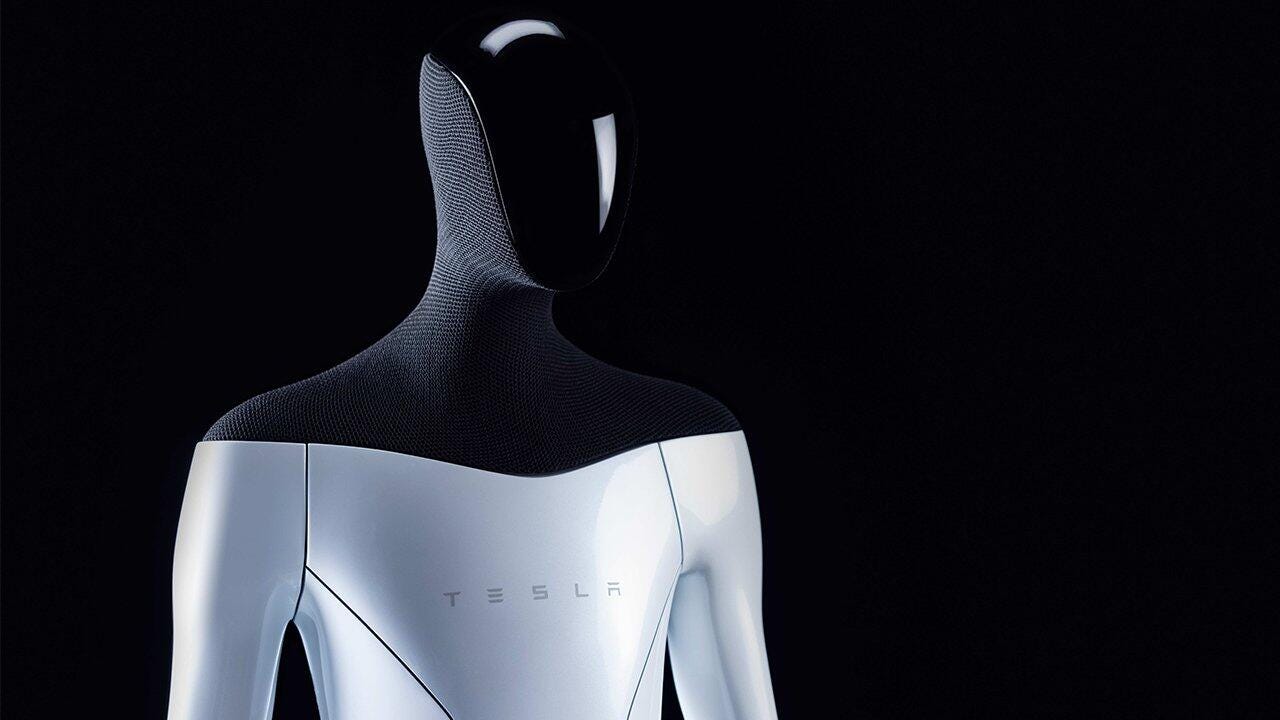































 Tesla
Tesla Tesla is set to unveil a new humanoid robot, called Optimus, in late September. There's been a lot of speculation surrounding Tesla's strategy in entering the robotics market, and a recent post by boss Elon Musk sheds some new light.
In the post, published in the China's Cyberspace Administration's official publication, Musk continued to make the point he's underlined since announcing the Tesla Bot project in 2021: That Tesla, because of its major investments in autonomous driving, is arguably the biggest robotics company in the world.
While some of the big robotics players like ABB might take exception to the classification, it's a fair point. Tesla deals not only in the software underpinnings of automation (AI, neural nets, differential engines), but also in the hardware (sensors, actuators). The company's efforts have focused on machines with wheels, but is it really a far leap to put the same technology into a bipedal humanoid? Just a few years ago the answer would probably be yes, that is a pretty big leap. But advances in replicating bipedal gait made over the last decade-and-a-half, along with robotics controls progress from companies like Boston Dynamics, have paved the way for a new class of humanoid robots.
Perhaps a more pertinent question is how a humanoid robot fits into Tesla's business model, and the answer isn't so clear. In his post, Musk clearly emphasizes that the idea is to eventually target the consumer market with home robotics. But that's proven a spectacularly frugal market, one that hasn't matured appreciably outside a few notable exceptions (iRobot's Roomba most prominent among them). Of course that doesn't mean the market won't evolve, and with Amazon's purchase of iRobot it's a safe bet we're going to see a lot of marketing in that direction.
But it's a far trip from a robot vacuum to a humanoid robot, and a lot has to happen in terms of technology development and production cost to make that reality feasible. Most likely what Musk is doing is positioning Tesla to be part of the fight in coming decades. Whether the company's development interest can survive what will almost certainly be a letdown after the recent hype (humanoid robots just aren't ready for primetime when it comes to performing a variety of common tasks in unstructured environments) remains to be seen.
Here's an excerpt of Musk's post, translated for the Substack Beijing Channel from Chinese:
Today's cars are increasingly like smart, web-connected robots on wheels. In fact, in addition to cars, humanoid robots are also becoming a reality, with Tesla launching a general-purpose humanoid robot (Tesla Bot) in 2021. The Tesla Bot is close to the height and weight of an adult, can carry or pick up heavy objects, walk fast in small steps, and the screen on its face is an interactive interface for communication with people. You may wonder why we designed this robot with legs. Because human society is based on the interaction of a bipedal humanoid with two arms and ten fingers. So if we want a robot to adapt to its environment and be able to do what humans do, it has to be roughly the same size, shape, and capabilities as a human.
Tesla Bots are initially positioned to replace people in repetitive, boring, and dangerous tasks. But the vision is for them to serve millions of households, such as cooking, mowing lawns, and caring for the elderly.
Achieving this goal requires that robots evolve to be smart enough and for us to have the ability to mass produce robots. Our "four-wheeled robots" -cars -have changed the way people travel and even live. One day when we solve the problem of self-driving cars (i.e., real-world artificial intelligence), we will be able to extend artificial intelligence technology to humanoid robots, which will have a much broader application than cars.
We plan to launch the first prototype of a humanoid robot this year and focus on improving the intelligence of that robot and solving the problem of large-scale production. Thereafter, humanoid robots' usefulness will increase yearly as production scales up and costs fall. In the future, a home robot may be cheaper than a car. Perhaps in less than a decade, people will be able to buy a robot for their parents as a birthday gift.
It is foreseeable that with the power of robots, we will create an era of extreme abundance of goods and services, where everyone can live a life of abundance. Perhaps the only scarcity that will exist in the future is for us to create ourselves as humans.
 Etiquetas calientes:
Inteligencia Artificial
innovación
Etiquetas calientes:
Inteligencia Artificial
innovación